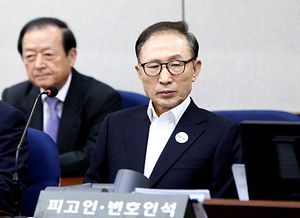In the few days before the end of 2022, South Korean President Yoon Suk-yeol invoked his presidential powers to pardon over 1,300 high-profile politicians, former officials, and leaders. It was his second round of pardons since he assumed office in May 2022. Yoon and members of his administration have said that these pardons are being granted in an effort to promote “national unity.”
The most prominent beneficiary of this round of presidential pardons was Lee Myung-bak, a former South Korean president who was in office from 2008 to 2013. In 2020, Lee was charged with embezzling more than 30 billion won ($23 million) and collecting bribes from a variety of institutions, including Samsung, while on the campaign trail and after he went into office in 2008. Lee was sentenced to 17 years in prison and the South Korean courts imposed a 13 billion won ($10 million) fine on him.
Lee was serving his 17-year sentence when Yoon issued his pardon, which went into effect on December 28. The pardon not only canceled the remaining 15 years of Lee’s sentence, but also voided the unpaid 8.2 billion won of the 13 billion won fine.
Lee was seen for the first time upon release in his neighborhood, where he made no mention of the pardons and instead called for unity amid the coronavirus pandemic. The main opposition Democratic Party members have reacted negatively to Lee’s release, arguing that Yoon is granting pardons to corrupt politicians and former officials, including those who served in the controversial Park Geun-hye administration. Lee and Park are conservatives, like Yoon and his People Power Party.
Pre-empting the backlash from progressives, Yoon also granted a special pardon to Kim Kyoung-soo, a former governor of South Gyeongsang province, who was also close to Yoon’s predecessor, Moon Jae-in. In 2019, Kim was sentenced to two years in prison for opinion-rigging operations prior to the special presidential election in 2017.
However, as Kim only had five months left in his sentence, the DP criticized Yoon’s decision, arguing he used Kim as a shield to pardon Lee. In fact, Yoon granted the special pardon despite Kim’s hand-written letter stating that he does not want to be pardoned. As Kim was pardoned without reinstatement, he remains barred from running for office until December 2027.
Pardoning former South Korean presidents who have been convicted of corruption is not an anomaly, and instead seems to be the norm. Then-South Korean President Moon ran on a platform of no sympathy for public and corporate officials convicted of corruption, pledging to clean the swamp and end the practice altogether once he was in office. Therefore, he received immense criticism when, at the end of 2021, he pardoned the disgraced former president Park, who was reported to be severely ill, in efforts to promote national unity.
Moon’s pardon of Park, which undermined his platform, came at an extremely heated time in South Korea’s presidential election campaign, while Park’s staunch conservative supporters were pushing for her release. South Korea’s first female president and the country’s first democratically elected leader to be ousted from office, Park was found guilty of collusion and corruption, and sentenced to 20 years in prison. Her scandal sowed seeds of public mistrust regarding the murky relationships between politicians and elite business officials.
Like Moon, Yoon also cited the promotion of national unity and cohesion as the motive for granting special pardons to controversial figures. Yet he too has faced hefty criticism for his actions. Yoon rose to prominence while he was a former chief prosecutor for his successful prosecution of both Lee and Park for their crimes. His pardon of Lee weakens the graft-busting image he built before his presidency.
Yoon currently faces a divided conservative front, where supporters are loyal to either Lee or Park. There are suspicions that the releases of both former presidents, huge figures in the conservative party, are meant to galvanize and unite these two blocs of conservative Koreans.
A previous version of this article said that this was Yoon’s third round of pardons and misstated the year he assumed office.






























